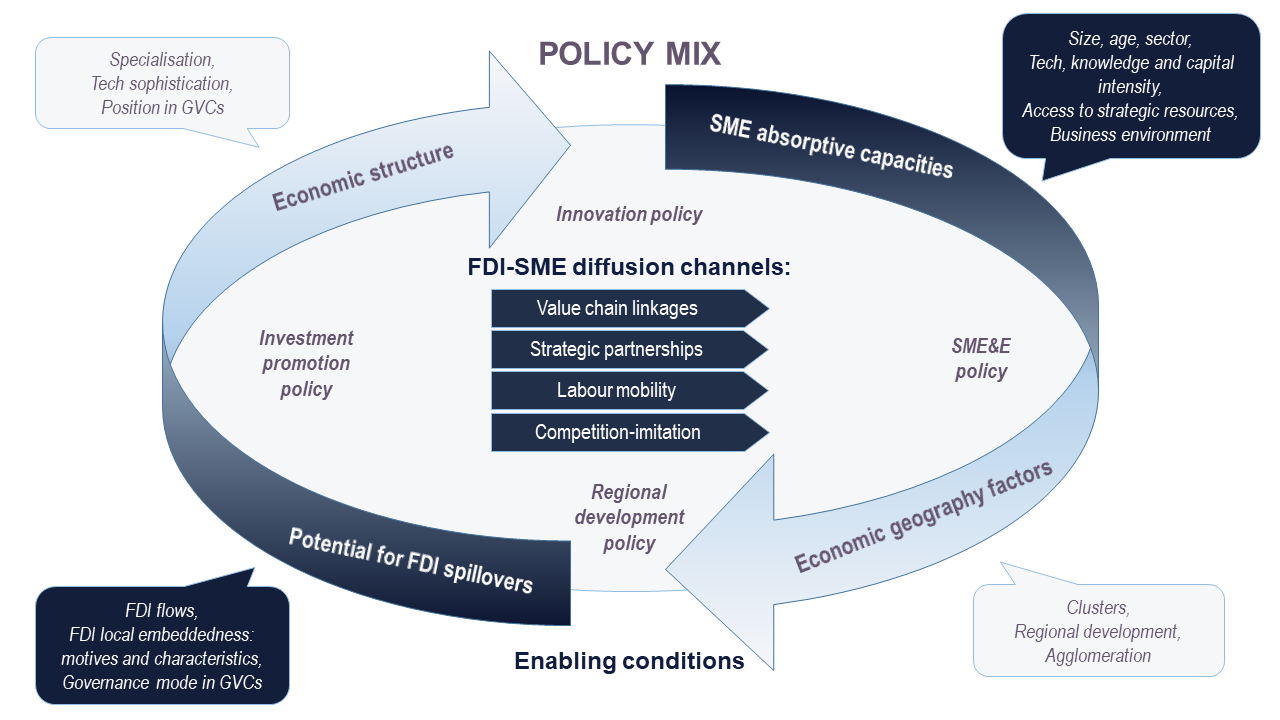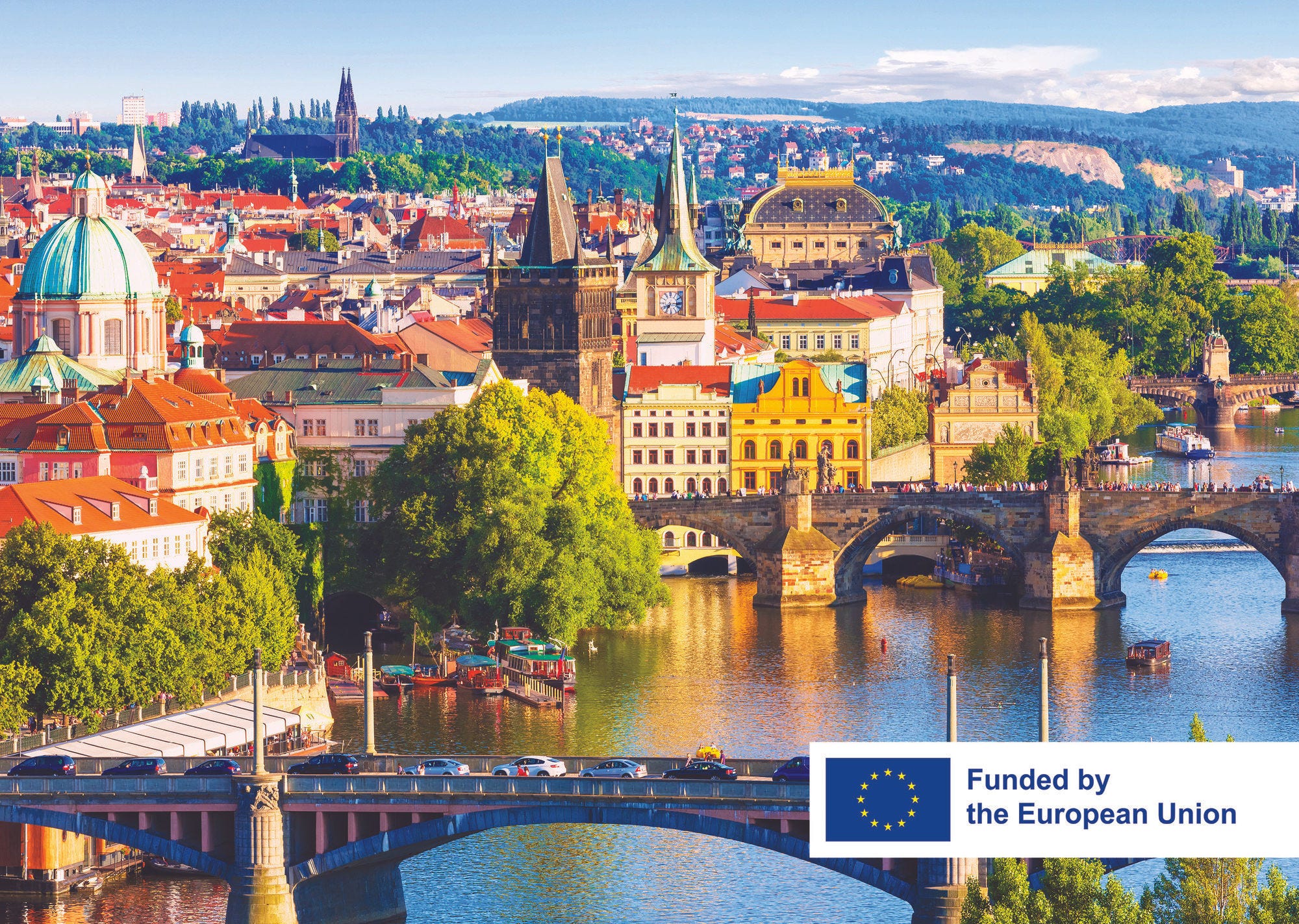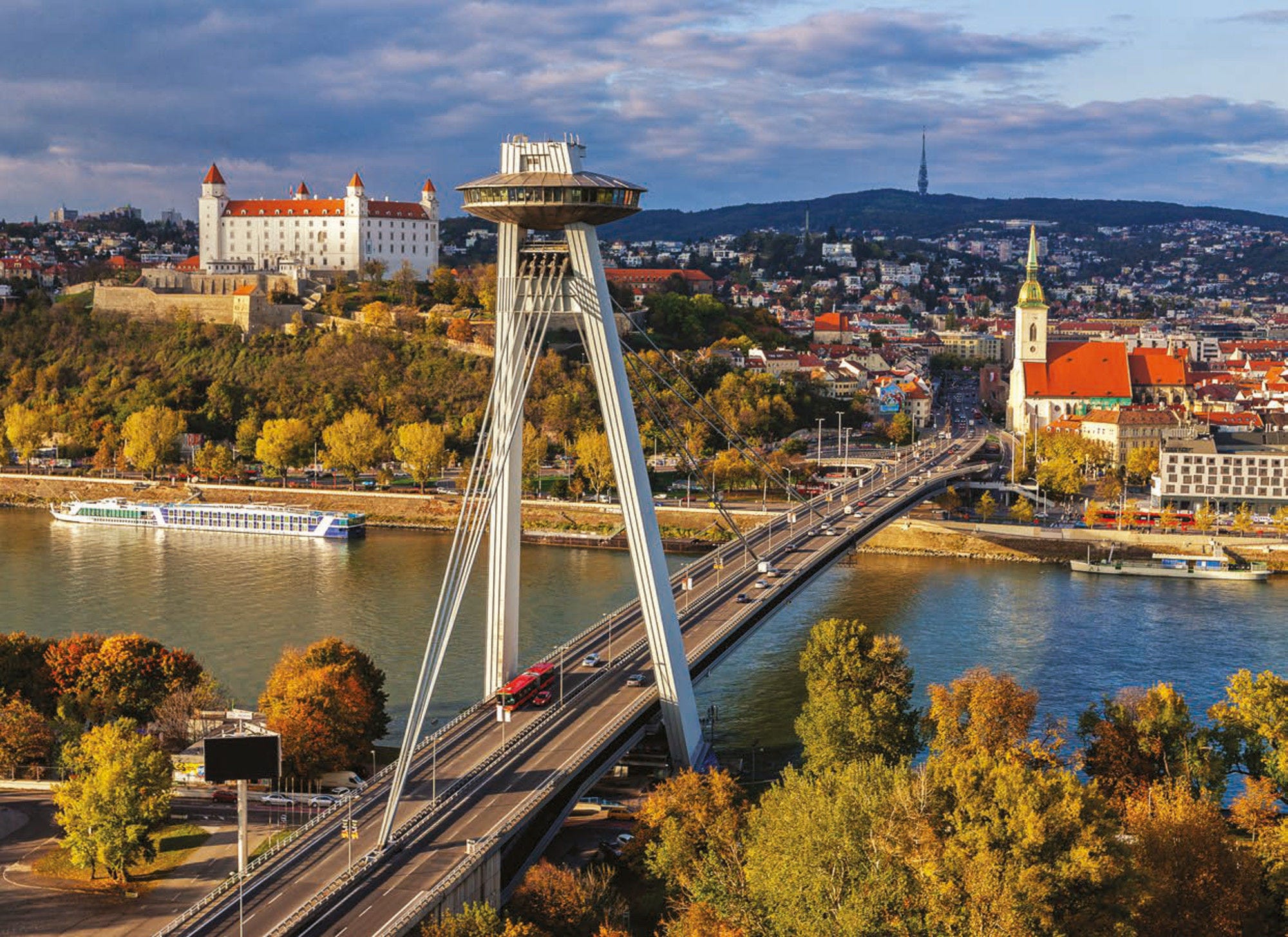The FDI-SME is a multi-year project conducted by the OECD in collaboration with the European Commission (DG REGIO). It aims to offer tailored policy advice to countries and regions on how to develop linkages between foreign direct investment (FDI) and local small and medium‑sized enterprises (SMEs), and how to strengthen FDI-SME ecosystems that can create more opportunities of productivity and innovation spillovers in heterogeneous contexts for local economic development and resilience.
FDI-SME Ecosystems to boost productivity and innovation
The project focuses on fostering countries’ conditions for leveraging foreign direct investment (FDI) by local small and medium-sized enterprises (SMEs), with the aim of enhancing their productivity and innovation.
About the project
Why a project on fostering FDI-SME ecosystems?
- Achieving more resilient, sustainable and inclusive growth requires more productivity and innovation, as well as greater diffusion across regions to bridge inequalities and divides. Two drivers of performance could be strengthened: SMEs that make the economic fabric of many places, and FDI that contributes to the knowledge base and capital stock of the host places.
- Boosting productivity and innovation requires fostering FDI‑SME ecosystems. International investment and domestic SMEs are interlinked. FDI can help SMEs increase productivity and innovation, through knowledge and technology spillovers. SMEs and their innovation capacities are an important determinant for FDI location.
- Strengthening FDI-SME linkages and spillovers have become even more important in a post COVID‑19 recovery phase, as firms - small and large - and places look for competitiveness and resilience within domestic and global value chains.
- Governments at national and sub‑national levels have a crucial role to play in creating the business and policy conditions for stronger FDI-SME linkages and spillovers. Public intervention can take place at the crossroad of investment promotion, innovation, SME and entrepreneurship, and regional development policies, and coordination across the board is key.
- Effective policy intervention requires however a better understanding of how FDI can affect the productivity and innovation of local SMEs and which SMEs can attract quality FDI, as well as the conditions and policies that can enable greater spillovers and resilience.
Understanding FDI-SME spillovers: A conceptual framework

How it works
The mission of the FDI-SME project is to provide policy advice on how to strengthen foreign direct investment (FDI) impacts on the productivity and innovation of European SMEs. The work also facilitates policy dialogue among government agencies and supports capacity building as well as peer-learning with other EU countries.
The objectives of the FDI-SME project are to:
- Better understand how FDI can affect the productivity and innovation capacity of local SMEs, and how governments can increase the potential of FDI spillovers, the absorptive capacity of SMEs and the efficiency of diffusion channels between the two.
- Increase capacity and evidence base to provide countries and regions with policy advice on how to build stronger FDI SME ecosystems in a changing global trade and investment environment.
- Better understand the diversity of FDI-SME ecosystems across EU countries and regions, and how public policies can help them evolve to boost productivity and innovation in different contexts.
- Encourage inter-governmental dialogue with policymakers from EU, OECD and partner economies to foster mutual learning and ensure the work benefits all.
Published:
- Map the FDI-SMEs policies and institutions in place across EU countries.
- Design a policy toolkit for national and subnational governments to assess the potential of FDI-SME linkages, identify gaps in diffusion and find policy options to enable greater FDI-SME spillovers.
- Test the policy toolkit and diagnostic tools through in‑depth country assessments of Portugal and the Slovak Republic, with additional regional focus.
Upcoming:
- Test the policy toolkit and diagnostic tools through in‑depth country assessments of Czechia, and Poland, with additional regional focus.
- Conducting one cross-country assessment, with analysis at supranational level, providing a cross-border perspective on FDI-SME ecosystems.
- Exploring how FDI-SME ecosystems could evolve in a context of reconfiguring global value chains, through foresight exercises and three industrial case studies of the automotive value chain, cleantech value chains (batteries, photovoltaics, and wind turbines), and soon to be identified another value chain.
- Preparing an analytical report on the diversity of FDI-SME ecosystems and how public policies effectively help FDI-SME ecosystems to become more attractive and resilient, based on empirical work.
- Build capacity through peer-learning, inter‑agency consultation and national, subnational and international stakeholder policy dialogue.
Events
- Second foresight workshop on powering the future: charting the evolution of cleantech manufacturing; Paris, 4 March 2024
- First foresight workshop on the future of automotive value chain and the role of FDI-SME ecosystems; Paris, 25 September 2023
- Launch of the Policy Toolkit for Strengthening FDI and SME Linkages report at the Smart Specialisation Strategies (S3) Community of Practice (CoP) Conference; Brussels, 30 March 2023
- High-Level launch of the report Strengthening FDI and SME Linkages in the Slovak Republic; Bratislava, 28 March 2023
- Launch of the review Strengthening FDI and SME linkages in Portugal; 12 January 2022
Related Publications
Partnership
The FDI-SME project is conducted in cooperation and with the support of the European Commission (EC)’s Directorate General for Regional and Urban Policy (DG REGIO).
It is developed jointly by the OECD Centre for Entrepreneurship, SMEs, Regions and Cities (CFE/SMEE) and the OECD Directorate for Financial and Enterprise Affairs (DAF/INV) under the aegis of the OECD Committee on SMEs and Entrepreneurship (CSMEE), and the OECD Investment Committee (IC). The project also benefits from consultation of the OECD Regional Development Policy Committee (RDPC).
The FDI-SME project contributes a building block of the OECD Data Lake on SMEs and Entrepreneurship and the monitoring infrastructure of the CSMEE.
Get in touch
If you are interested to learn more about the project or to get involved, please contact:



